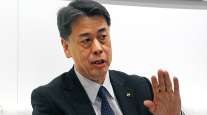Bloomberg News
Fugitive Carlos Ghosn Aims to Settle Scores in Book

[Stay on top of transportation news: Get TTNews in your inbox.]
Executive-turned-international fugitive Carlos Ghosn is gunning for revenge in a new book published this week about the events surrounding his arrest in Tokyo two years ago, 130-day Japanese imprisonment and dramatic escape to Lebanon.
The former high-flying chairman of Nissan Motor Co. and Renault SA, who has denied financial misconduct charges leveled against him, has long said he was set up to prevent deeper integration between the two automakers, part of a three-way alliance with Mitsubishi Motors Corp. Ghosn remains holed up in Beirut after jumping bail in December and fleeing Tokyo with the help of a former Green Beret, who with his son is now facing extradition to Japan from the U.S.
Earlier this year, Ghosn promised the book would contain fresh revelations that would add to a narrative worthy of a Hollywood movie. It would show “clear evidence” of collusion among Nissan, Japanese prosecutors and the government, he said.

Nissan logo by Paul Sancya/AP
But “Le Temps de la Verite,” or “Time for the Truth,” published by Paris-based Grasset, mostly sticks to the defense his lawyers already have put forward: claiming lack of proof for accusations of financial transgressions; the innocent “friendly backing” of a Saudi Arabian business partner, Khaled Juffali; and 10 levels of internal decision-making at Nissan that would have prevented any untoward use of company funds.
What Ghosn does deliver with his co-author, former Agence France-Presse journalist Philippe Ries, is his version of the November 2018 arrest, interrogation and behind-the-scenes boardroom machinations at the automotive alliance, which is struggling in the aftermath of his dismissal.
The 473-page tome also chronicles Ghosn’s career achievements at length, interactions with heads of state including Vladimir Putin of Russia and former Brazilian President Dilma Rousseff and even includes a mea culpa or two about his odd management stumble.
He gives a wide berth on former Nissan director Greg Kelly, who is facing trial on charges of helping Ghosn hide millions of dollars in compensation, but devotes many pages justifying his pay as a member of the elite club of global top managers. Declining an offer to head General Motors Co. to lead the U.S. carmaker’s turnaround was “the biggest mistake of my life,” Ghosn said.
Ghosn takes aim at a broad array of players in the saga including Nissan, Renault, the governments of France and Japan, the Japanese justice system, the media and his first defense lawyers, deemed incompetent and “the worst team possible.”
A spokesperson for Nissan declined to comment on behalf of the company and its employees mentioned in the book.
Here’s what Ghosn had to say about some of the protagonists:
Nissan

Saikawa
Old Nissan” is how Ghosn describes what he sees as a cabal that allegedly worked to provoke his downfall and was led by board member Masakazu Toyoda, Hitoshi Kawaguchi, a former executive in charge of government relations, and auditor Hidetoshi Imazu. Hiroto Saikawa, his successor-turned-accuser — who himself had to step down as Nissan’s chief executive following a scandal over compensation — was also involved, according to Ghosn, as was Hari Nada, another insider, who was told to cooperate or he would go to prison.
Japanese Government
A close, even friendly relationship between Kawaguchi and now-Prime Minister Yoshihide Suga, who was No. 2 in the Japanese government at the time, lay at the heart of the alleged plot, according to Ghosn. He also points to lawyer Akihide Kumada, a former adviser to former Prime Minister Shinzo Abe, as having established contacts between Nissan plotters, the government and prosecutors. Ghosn has long maintained that Nissan and the government were jolted into action by his re-election to head Renault with a French government mandate to make the alliance irreversible, a move that threatened the Japanese carmaker’s independence.
French Government
France comes under attack for what Ghosn terms as “appeasement” to the Japanese. He also faults the government for blindly seeking to raise its holding in Renault while ignoring potentially damaging consequences for the relationship with Nissan and the Japanese. The book also isn’t kind to Renault Chairman Jean-Dominique Senard, deemed the “anti-Ghosn” aristocrat who helped in the capitulation of Renault in the face of Nissan.
The Media
Ghosn and Ries slam coverage of the affair by both the Japanese and international press, saying journalists were guilty of laziness and regurgitation of a smear campaign worthy of Josef Stalin’s propaganda machine. They take aim at the Japanese press for allegedly close ties with the prosecution and also point fingers at French business newspaper Les Echos — and more generally at the rest of the media — for publishing a steady stream of leaks against the executive.
His Supporters
While Ghosn dumps on France’s business elite for mostly failing to come to his defense, a number of protagonists are singled out for their support. These include Thierry Bollore, the former CEO of Renault who was fired last year, Jose Munoz, the former Nissan executive who left shortly after Ghosn’s arrest, Thierry Breton, now a European commissioner, former Renault general secretary Mouna Sepehri, Juffali and French diplomats.
The chaotic scene at Nissan headquarters following his arrest is described in the book by Munoz and a computer specialist, while his daughter, Maya, was apparently told of an impending search warrant and the “plot” against her father by an unnamed tipster.
Want more news? Listen to today's daily briefing:
Subscribe: Apple Podcasts | Spotify | Amazon Alexa | Google Assistant | More




